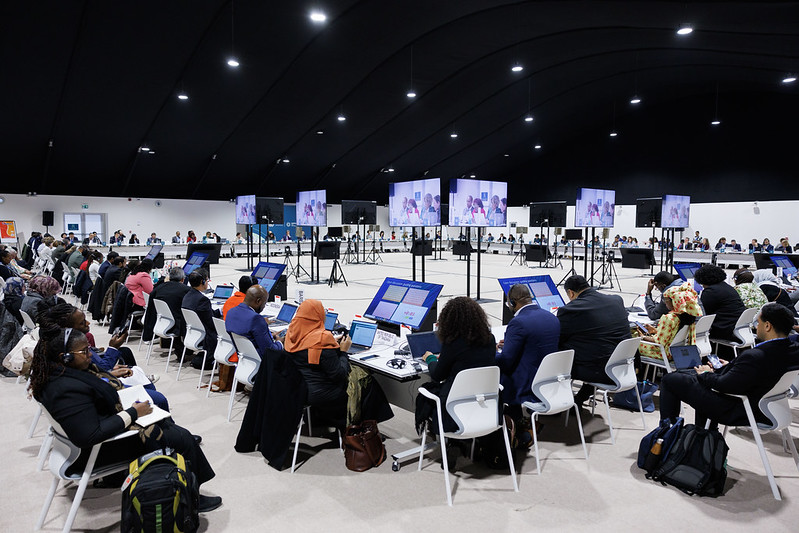The first week of the United Nations Climate Change Conference (COP29) in Baku, Azerbaijan saw continued disagreement over the financial deal that is considered a top goal of the conference, but other concrete developments were achieved.
Week one of the Nov. 11-22 COP29 gathering drew approximately 53,000 attendees into critical discussions about climate justice and global environmental action.
“The fight for a cleaner, safer planet will not stop,” declared U.S. climate envoy John Podesta.
Climate finance a sticking point
Negotiations will continue over the main goal announced for COP29: setting new annual targets for funding that developed countries will contribute to developing countries to support greenhouse-gas reductions.
Under a previous agreement, developed countries have increased their support to developing countries from $22 billion in 2021 to $28 billion in 2022, and are on the way to achieving an earlier goal of $38 billion by 2025, according to the UN Environment Program’s Adaption Gap Report, released Nov. 7. Even if this goal is reached, however, there will still be an “adaption finance gap” of $187-$359 billion per year, the report said.
The parties in Baku are now negotiating a New Collective Quantified Goal (NCQG) to outline what each of the 198 COP countries that have ratified the United Nations Framework Convention on Climate Change (UNFCCC) would either pay or receive.
The developed countries who would contribute to the NCQG were established in the Rio Summit in 1992: U.S., EU countries, U.K., Japan, Canada, Switzerland, Turkey, Norway, Iceland, New Zealand, and Australia. These countries have called funding requests from Arab and African countries unrealistic and have argued that China and the Gulf countries should be added to the list of donors.
China has said it will make voluntary donations but will not agree to be an official contributor. China has provided more than $24.5 billion of climate finance since 2016 to support developing countries’ efforts to cope with climate change, Chinese Vice Premier Ding Xuexiang told COP29 on Nov. 12.
UN climate chief Simon Stiell said in Baku that higher contributions under the NCQG is in the interest of the developed countries.
“Climate impacts are already ripping shreds out of every G20 economy, wrecking lives, pummeling supply chains and food prices, and fanning inflation,” he said. “Bolder climate action is basic self-preservation for every G20 economy. Without rapid cuts in emissions, no G20 economy will be spared from climate-driven economic carnage.”
Nations step up with new emission reduction commitments
Several major economies announced enhanced climate targets during the summit’s opening days. The U.K. emerged as an early leader, with Prime Minister Keir Starmer pledging an ambitious 81% reduction in greenhouse gas emissions by 2035 compared to 1990 levels. Greenpeace lauded the commitment for demonstrating “willingness to be a global leader on climate.”
Indonesia promised significant changes. “Starting from 2025, we will bring the emission reduction targets to the sub-national level, promoting a more integrated approach to climate actions in all provinces and regional governments,” announced Environment Director Priyanto Rohmatullah, outlining the country’s path toward its net-zero goal by 2060 or earlier.
Brazil and the United Arab Emirates (UAE) also stepped forward with new commitments. However, climate experts note that neither country’s climate action plans, called Nationally Determined Contributions (NDCs), align with the crucial 1.5°C global temperature reduction goal, particularly as both nations continue to pursue oil and gas expansion.
Carbon trading mechanisms: Progress amid controversy
The summit’s first day saw the rapid adoption of a centralized carbon trading mechanism under Article 6.4 of the Paris Agreement. However, the swift adoption without discussion sparked immediate backlash. “Kicking off COP29 with a backdoor deal … sets a poor precedent for transparency and proper governance,” said Isa Mulder, a policy expert at Carbon Market Watch. “This undermined trust in the UN climate conference process.”
Methane emissions: Industry accountability in focus
Regarding methane, “the industry’s commitment to reducing overall emissions has stalled for the second year running,” Carbon Tracker’s latest report revealed, highlighting a critical gap in climate action. The analysis found that while most large producers claim to target “near zero” methane emissions by 2030, none have set comprehensive targets covering all their business activities.
Deforestation and food security challenges
The food security situation appears particularly dire. A comprehensive analysis revealed that of the 195 countries attending COP29, only 12 have committed to reducing food waste, with just 17 pledging to tackle food loss.
A call for reform
A group of influential climate policy experts, including former UN secretary-general Ban Ki-moon, former UN climate chief Christiana Figueres, and Earth scientist Johan Rockström, issued a powerful statement declaring that COP summits are “no longer fit for purpose.” They demanded reform, stating: “We need strict eligibility criteria to exclude countries who do not support the phase-out/transition away from fossil energy. Host countries must demonstrate their high level of ambition to uphold the goals of the Paris agreement.”
Looking ahead
As Brazil prepares to host next year’s summit, President Luiz Inácio Lula da Silva made a passionate plea regarding potential U.S. withdrawal from climate agreements under a Trump presidency: “The fight for climate action must continue,” he urged.
This sentiment was echoed by global leaders, with UN Secretary-General António Guterres joining Exxon’s CEO Darren Woods and former U.S. climate envoy John Kerry in urging against any potential U.S. withdrawal from the Paris Agreement.
U.S. climate envoy Podesta offered reassurance, stating that “although under Donald Trump’s leadership the U.S. federal government placed climate-related actions on the back burner, efforts to prevent climate change remain a commitment in the U.S. and will confidently continue.”














